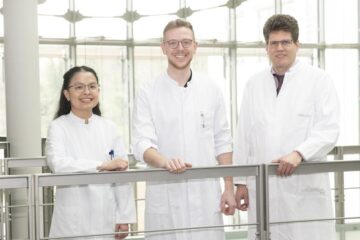Immunocompatibility Of Happy Parents

Genes of the main histocompatibility complex (called HLA with human beings) are responsible for recognition of alien proteins. These genes are numerous, and their variety is wide. When a person is to select a donor for transplantation, the donor is looked for by HLA-compatibility in particular. Coincidence in all known HLA antigens is a practically impossible event, however, it is sufficient to select a pair for transplantation which coincides in several HLA gene sequences. Physicians have recently found out that the HLA genes influence some reproductive disorders, however, the data on such impact is still contradictory.
The Moscow researchers have investigated the influence of the conjoints’ histocompatibility rate on the toxicosis development and gravity in the second half of pregnancy. They observed the course of pregnancy with 27 married couples, where the current or previous pregnancy proceeded with toxicosis, and 10 couples with physiological course of pregnancy, who made the reference group.
It has turned out that toxicosis occurs more frequently with women who have more than two identical HLA gene sequences with the child’s father. The coincidences were discovered with all the couples in the main group, while in the reference group – they were discovered in less than a half of cases. The more coincidences were between the husband and wife (in the large number of HLA gene sequences), the higher the gravity of toxicosis was. In the reference group, the number of coincidences was no more than two.
From the immunology perspective, the fetus is a transplant. Half of its genes is obtained from the father, therefore, a lot of fetus’ proteins are perceived by the mother’s organism as alien ones and should be rejected. However, the rejection does not happen as in the normal pregnancy course as the mother’s immune system transforms and becomes “tolerant” to the alien embryo. The difference in some loci of HLA-genes of the mother and the fetus becomes the very signal that sets the woman’s immune system to pregnancy. If the mother and the future child have turned out to be histocompatible, the immune system does not change, and the mother’s organism may reject the fetus. That is why a lot of specialists consider toxicosis as a clinical form of the fetus rejection in the second half of pregnancy.
In case of toxicosis, placenta develops improperly and is poorly supplied with blood, as it insufficiently grows into the womb tissue. As a result, the fetus suffers from the lack of oxygen and nutrients, and infants are born impaired and with deficiency in weight (they can even die in case of grave toxicosis). The histocompatibility analysis of married couples allows physicians to significantly enhance the notion of immunological component, toxicosis origin and its course. However, it can hardly be expected that in the near future the father for the future child will be selected as scrupulously as the donor for transplantation.
Media Contact
More Information:
http://www.informnauka.ruAll latest news from the category: Health and Medicine
This subject area encompasses research and studies in the field of human medicine.
Among the wide-ranging list of topics covered here are anesthesiology, anatomy, surgery, human genetics, hygiene and environmental medicine, internal medicine, neurology, pharmacology, physiology, urology and dental medicine.
Newest articles

Airborne single-photon lidar system achieves high-resolution 3D imaging
Compact, low-power system opens doors for photon-efficient drone and satellite-based environmental monitoring and mapping. Researchers have developed a compact and lightweight single-photon airborne lidar system that can acquire high-resolution 3D…

Simplified diagnosis of rare eye diseases
Uveitis experts provide an overview of an underestimated imaging technique. Uveitis is a rare inflammatory eye disease. Posterior and panuveitis in particular are associated with a poor prognosis and a…

Targeted use of enfortumab vedotin for the treatment of advanced urothelial carcinoma
New study identifies NECTIN4 amplification as a promising biomarker – Under the leadership of PD Dr. Niklas Klümper, Assistant Physician at the Department of Urology at the University Hospital Bonn…





















